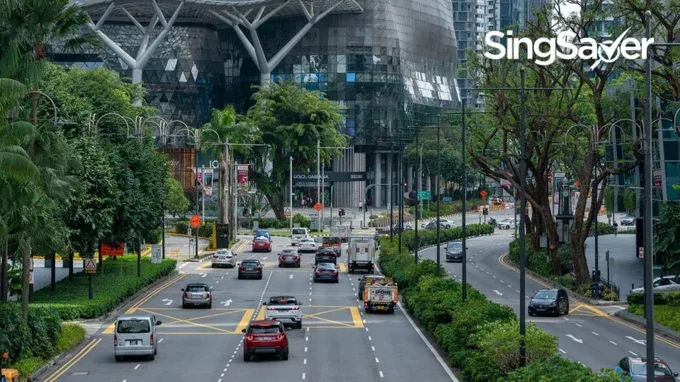Managing the Hidden Costs of Car Depreciation
Updated: 24 Jul 2025
Written bySingSaver Team
Team

The information on this page is for educational and informational purposes only and should not be considered financial or investment advice. While we review and compare financial products to help you find the best options, we do not provide personalised recommendations or investment advisory services. Always do your own research or consult a licensed financial professional before making any financial decisions.
If you’re a car owner, you know that time is not on your side. Unfortunately, unlike fine wine or vintage watches, a car's value generally decreases over time. This is the dreaded "D" word: depreciation.
While it's an unavoidable part of the total cost of owning a car, you only feel the sting when you decide to sell or trade it in. But don't worry because we’ll show you how to evaluate car depreciation using key calculations. We’ll also share strategies to manage car depreciation and keep your vehicle’s value as healthy as possible.
Find the best car insurance for your needs
Get car insurance quotes and discover the ideal rates that meet your coverage needs.
Depreciation of new cars
Here's the bad news: your shiny new car starts losing value the moment you drive it off the lot.
In Singapore, car depreciation hits hard in the first three years, with a significant chunk of the car's value disappearing during this period. This is largely due to factors unique to Singapore's car market, such as the Certificate of Entitlement (COE) and Additional Registration Fee (ARF), which contribute to the initial high cost of a new car.
But here's where it gets interesting: car depreciation isn't linear.
The first three years are like that initial plunge, where you lose the most value, and selling your car during this period is usually not advisable unless you have no other choice.
However, from the fourth to the eighth year, depreciation starts to stabilise, and this is the "sweet spot" where you can get a more reasonable price for your car if you decide to sell. Also, understanding this depreciation curve can help you make informed decisions about when to sell or trade in your vehicle, minimising your losses and maximising your returns.
But how do you calculate car depreciation?
Here’s a simple formula you can use:
Annual depreciation = (Total cost of vehicle – Sale value of vehicle) / No. of years in service
The total cost of your vehicle includes several components, such as the Open Market Value (OMV), which is the price paid for importing the car into Singapore. It also includes the Registration Fee (RF), a flat fee tax of S$220, and the Additional Registration Fee (ARF), a tiered tax based on your car's OMV. Finally, the Certificate of Entitlement (COE), a 10-year license to own a car in Singapore, is a major contributor to the total cost.
Tips on managing car depreciation
While depreciation is an inevitable part of car ownership, there are several strategies you can employ to minimise its impact and retain your car's value.
Buying a used car
One of the most effective ways to manage car depreciation is to consider buying a used car. By opting for a pre-owned vehicle, you avoid the steepest part of the depreciation curve—that initial drop in value when a new car leaves the showroom. Besides, used cars depreciate at a slower rate, especially those that are a few years old.
However, it's important to understand the factors that influence used car prices in Singapore. The OMV, COE, and ARF rebates all play a role in determining the value of a used car.
The Preferential Additional Registration Fee (PARF) rebate, for instance, applies when you deregister a car within the 10-year period and can range from 50% to 75% of the ARF paid. Additionally, you may be eligible for a COE rebate for any unused portion of your COE at the time of deregistration.
Learning about resale value
If you're set on buying a new car, choosing a model with good resale value can help you manage depreciation. Some brands and models are known to hold their value better than others due to factors like popularity, reliability, and market demand.
The OMV, COE, and ARF rebates also play a significant role in determining the resale value of a car. For example, a higher OMV generally translates to a higher resale value, while a car with a longer remaining COE duration will be more desirable in the used car market. So, remember to consider how these factors interplay when choosing a car that retains its value well, minimising your losses when it's time to sell or trade in.
Leasing a car
Leasing a car can be a viable alternative to buying, especially if you're concerned about long-term depreciation. When you lease, you're essentially paying for the car's depreciation during the lease period, along with taxes and interest. This means you don't have to worry about the car's declining value or the hassle of selling it later.
However, leasing has its own set of considerations. For example, you will not own the car at the end of the lease term. Plus, you'll have to make monthly payments throughout the lease duration. So, assess the pros and cons of leasing versus buying to identify the option that aligns with your financial goals and lifestyle preferences.
In Singapore, leasing makes sense for those who prefer to drive a new car every few years without the hassle of reselling or dealing with depreciation. It can also be a good option for those who don't want to tie up a huge capital in a depreciating asset.
Foregoing car customisations
While customising your car can be a fun way to express your personality, it's important to remember that modifications can significantly impact its resale value. Over-customising your car with flashy paint jobs, loud exhausts, or aftermarket body kits can narrow the list of potential buyers and make it harder to sell later.
Also, there are strict regulations on car modifications in Singapore. Some modifications, such as those affecting emissions or safety features, may not be allowed, and others may require approval from the Land Transport Authority (LTA). Aside from affecting your car’s resale value, unapproved modifications can also lead to fines or even the deregistration of your vehicle.
If you plan to sell or trade in your car in the future, it's generally advisable to keep modifications to a minimum. Stick to reversible modifications or those that are widely accepted in the used car market. This will also help you achieve a better resale value.
Car maintenance and record keeping
Regular maintenance is important for preserving your car's value and minimising depreciation. After all, well-maintained cars with a documented service history are more attractive to potential buyers.
Aside from helping you track maintenance, keeping detailed service records also provides evidence of your car's condition, potentially leading to a higher resale value. Remember, you need to show proof of factors like mileage, accident history, and the frequency of servicing.
At the same time, when you stay on top of maintenance and keep thorough records, you can demonstrate that your car has been well cared for, reducing the effects of depreciation.
Selling your car to a direct buyer
When it's time to sell your car, you have two main options—trading it in via a dealership or selling it privately to a direct buyer. While trading in is convenient, selling privately often fetches a higher price since you're not losing a cut to the dealer.
However, selling privately requires more effort. For instance, you'll need to list your car on a platform like Sgcarmart. Then, you have to negotiate with potential buyers and handle the paperwork yourself. At the same time, it's crucial to be aware of potential pitfalls, such as lowball offers and scams.
Also, potential buyers might need financing to complete the purchase, and if they encounter difficulties securing a car loan, such as being rejected by banks or facing unfavourable loan terms, the sale could fall through. This can be frustrating and time-consuming for the seller, as they may have to restart the process with a new buyer.
However, despite the extra work, selling privately can significantly reduce the impact of depreciation and maximise your returns. By using a car depreciation calculator, setting a competitive price, presenting your car well, and negotiating effectively, you can achieve a higher selling price than a dealer trade-in.
Is buying a new car worth it?
While new cars come with a hefty depreciation hit, there are situations where buying new might make sense. Manufacturer incentives, favourable car loan rates, and comprehensive warranties, for instance, can offset some of the depreciation costs.
However, in Singapore, the COE and ARF can still influence the cost of new cars, so it's crucial to weigh these factors against the benefits of buying new. Also, whether you’re purchasing used or new, it’s important to manage depreciation. At the same time, choose models known for holding value. And once you own the car, avoid excessive modifications, maintain your car religiously, and keep service records.
When you keep track of these factors, you can minimise depreciation's impact on your car ownership journey until you decide to sell.
Understanding the costs of car ownership in Singapore
While we've focused on depreciation, it's crucial to remember that it's just one piece of the car ownership puzzle. Beyond the initial purchase price and the inevitable decline in value, several other costs contribute to the overall expense of owning a car in Singapore.
For instance, recurring expenses like road tax, car insurance, and regular maintenance can quickly add up. Fuel costs, parking fees, and Electronic Road Pricing (ERP) charges further contribute to the ongoing expenses of car ownership. So, it's essential to factor in these costs when budgeting for a car, as they can impact your finances over time.
Relevant articles
Stay ahead in everything finance
Subscribe to our newsletter and receive insightful articles, exclusive tips, and the latest financial news, delivered straight to your inbox.
Free car insurance calculator
Compare top car insurance companies instantly.
About the author
SingSaver Team
At SingSaver, we make personal finance accessible with easy to understand personal finance reads, tools and money hacks that simplify all of life’s financial decisions for you.

